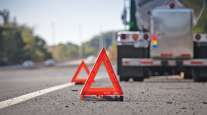Toyota Warns That Some Rivals Are Skipping Steps in Race to Autonomy

As the global auto industry vies to deploy driverless cars, some contenders may be cutting corners in a bid to get ahead, warned Jack Hollis, group vice president of U.S. sales for the Toyota brand.
“Some competitors, not by name because there are several, they’re trying to race to be the first one to show autonomous driving. I’m not so sure what being first gets you,” Hollis said on the sidelines of the New York International Auto Show. “What’s important is to be able to give the customer 100% confidence.”
Toyota Motor Corp. is one company in an expanding roster of traditional carmakers and Silicon Valley upstarts trying to bring autonomy to the masses, a lofty goal that’s facing new obstacles after an Uber Technologies Inc. vehicle operating in autonomous mode struck and killed a pedestrian earlier this month. The market is also trying to unravel whether or not a Tesla Inc. SUV was operating in so-called Autopilot mode when it was involved in a fatal crash on March 23.
Following the Uber accident, Toyota halted tests of its “Chauffeur” autonomous driving system on U.S. public roads. Toyota had been doing on-road testing with self-driving vehicles in Michigan and California with a small fleet of cars.
RELATED: Waymo CEO Krafcik aas ‘A lot of confidence’ his tech would have avoided deadly Uber accident
RELATED: Uber crash is nightmare driverless world feared but expected
“When it comes to safety, we don’t mess around,” Hollis said. “What’s going to happen is, when Toyota brings it out, we are going to be fully confident that every customer who wants to get into it can be 100% confident.”
“While some people want to jump and skip steps to get to autonomous 5, we’re going to take our steps, just like we do in every case, and be quality in every one,” he added. “There’s no reason to skip 3 and 4 because 2 begets 3.”
Level 3 is a semi-autonomous mode that’s more capable than cars where drivers do everything, but short of full automation.
Overall, Toyota is going to take its cues from consumers, Hollis said. Even before the Uber accident, 63% of Americans said they’d be afraid to ride in a fully self-driving car, according to a AAA survey.
“I’m not even sure what is the percentage of people who want fully autonomous driving anyways,” Hollis said. “Take for example, myself: I’d rather drive.”




